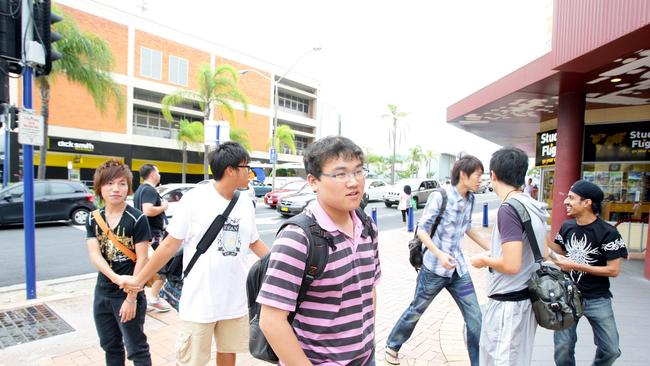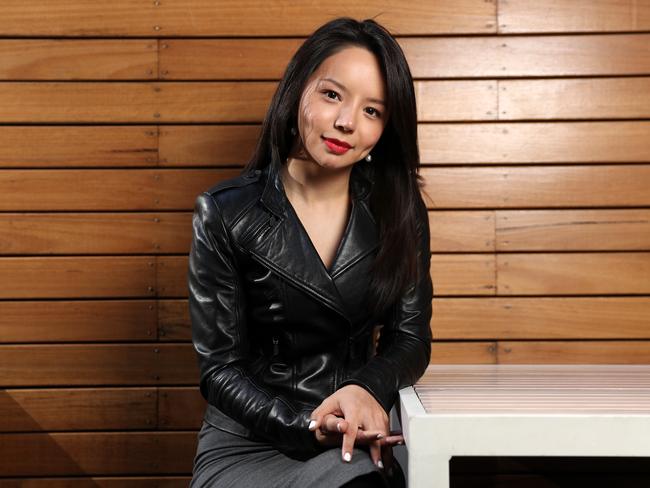Australian universities overexposed to relying on overseas students: report
Aussie universities have enrolled an “unsustainably risky” number of overseas students, with some lectures now 87 per cent foreign students.
- Tradie earnings often higher than university graduates’
- Opinion: Is sending your kid to uni really worth it?
Aussie universities have enrolled an “unsustainably risky” number of overseas students, with some lectures now 87 per cent foreign students.
Foreign students are particularly concentrated in business studies - with 40 per cent of five universities drawing their entire student body from overseas. At Sydney University the figure is 66.9 per cent and reaches 87.2 per cent in the masters business program.
This can harm academic standards but also exposes the university sector to “catastrophic” risks if the Chinese government imposed strict currency controls, experts warn, with a Centre For Independent Studies’ analysis cautioning about the excessive reliance on Chinese students.
Report author adjunct Professor Salvatore Babones said Sydney University took more than $500 million in Chinese student course fees in 2017, or 23 per cent of its total revenue.

MORE NEWS
Actor’s vile abuser faces justice 40 years on
‘Terrible tragedy’: Home And Away actor found dead
“At these levels … even small percentage declines in Chinese student numbers could induce significant financial hardship. Large percentage declines could be catastrophic,” Prof Babones said.
Prof Babones said Chinese enrolments were particularly unstable amid the slowing of the Chinese economy, and fluctuating currency values.
His data revealed, per capita, Australia had more international students than any other nation at 25 per cent, 10 per cent from China alone. Foreign enrolments at Sydney University, the University of NSW and the University of Technology exceeded 30 per cent.
Prof Babones said it would ultimately fall to taxpayers to pick up the tab if foreign student numbers plunged.

“Australia’s universities are taking a multibillion-dollar gamble with taxpayer money to pursue a high-risk, high-reward international growth strategy,” he said.
“A 50 per cent fall — which is plausible if the Chinese government were to impose strict currency controls — would yield a billion-dollar revenue hit.”
Prof Babones’ analysis also highlighted the problem of declining academic standards. “Australian universities routinely compromise admissions standards to accommodate international students,” he said.
In response to the analysis, UNSW, which had more than 15,000 Chinese students, said it had “broad and deep connections with China, stretching back 40 years”.
“The university was the first in Australia to establish a memorandum of understanding with the China Scholarship Council to provide pathways for some of China’s best and brightest research students to undertake doctoral studies,” a spokeswoman said.
Sydney University said it was “proud” of its international students’ contribution. “Given China’s population, location … and ongoing strong growth in demand for high quality international education, we anticipate continuing to attract Chinese students,” a spokeswoman said, adding the university had “an income diversification strategy” and had also seen a rise in students from the US and Canada.
A UTS spokeswoman did not directly address the issue of financial risk but said “international education” benefited the country “in many ways” including “$35.8 billion brought into our economy supporting more than 241,000 jobs”.
Education Minister Dan Tehan said Australia should be proud of its standard of education, and added universities were ultimately responsible for their own decisions.
ACTIVIST’S CHINA SYNDROME ALERT
Chinese human rights activist Anastasia Lin worries that Australian university revenue from Chinese students had “blinded” many people.
The former beauty queen and actor, in Sydney as The Centre For Independent Studies scholar in residence, said Australians had to open their eyes to the threats posed by the Chinese Communist Party.
“The Chinese Communist Party killed so many people (yet) Australian ministers are not eager to condemn them,” Ms Lin said.

“I think that it’s in Australia’s vital security interest to recognise what China is — they have treated the West with the Cold War mentality and still in parts of Australia there is a wilful blindness, they don’t want to believe it.
“(Universities) get a huge portion of revenue from Chinese students and so they censor themselves.
“These universities that have Confucius Institutes self-censor. The Confucius Institute has an employee agreement which says you can never say anything against the Chinese government.”
Ms Lin said Australian universities need to take a strong stance.
“If they are getting a lot of Chinese students … they need to show these students Western values that China is trying to censor.”



